Learning to cook all over again
After 40 years of self-taught cooking, I decided to take some classes - with interesting results. Plus: what I've been drinking this week
NB: I’M TAKING A TWO-WEEK SUMMER BREAK NOW - BACK ON 4 SEPT
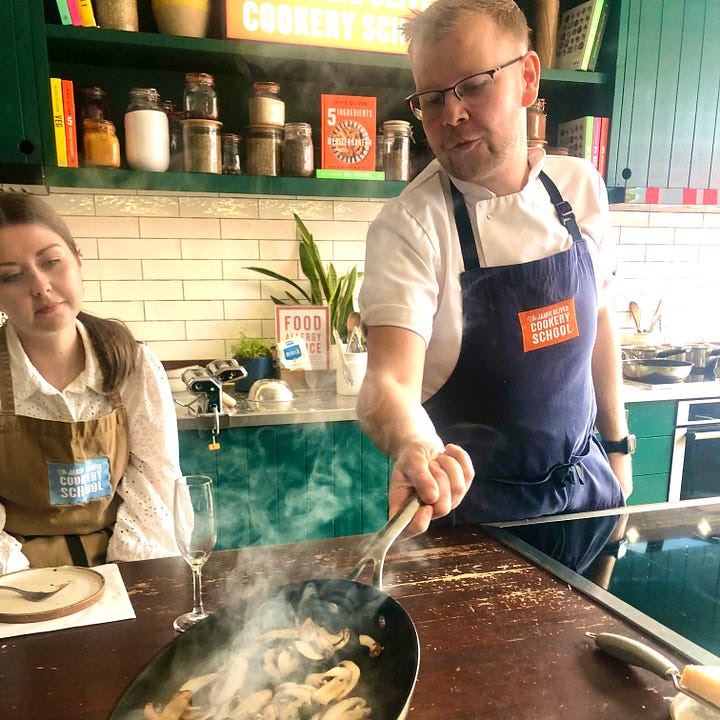
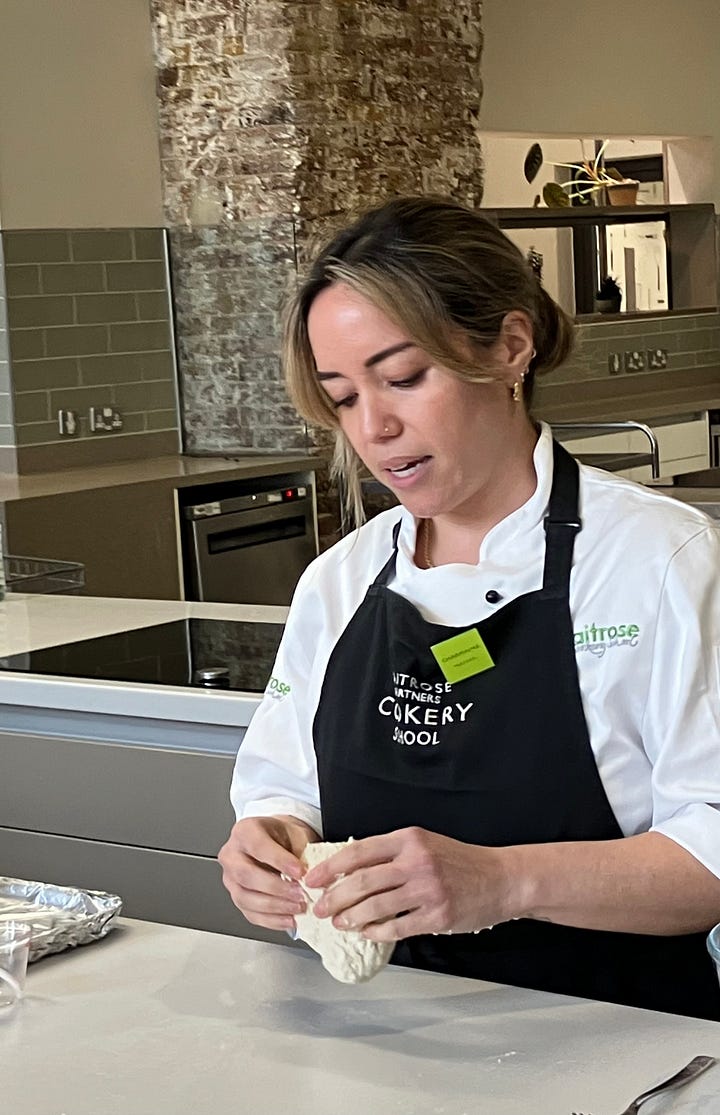
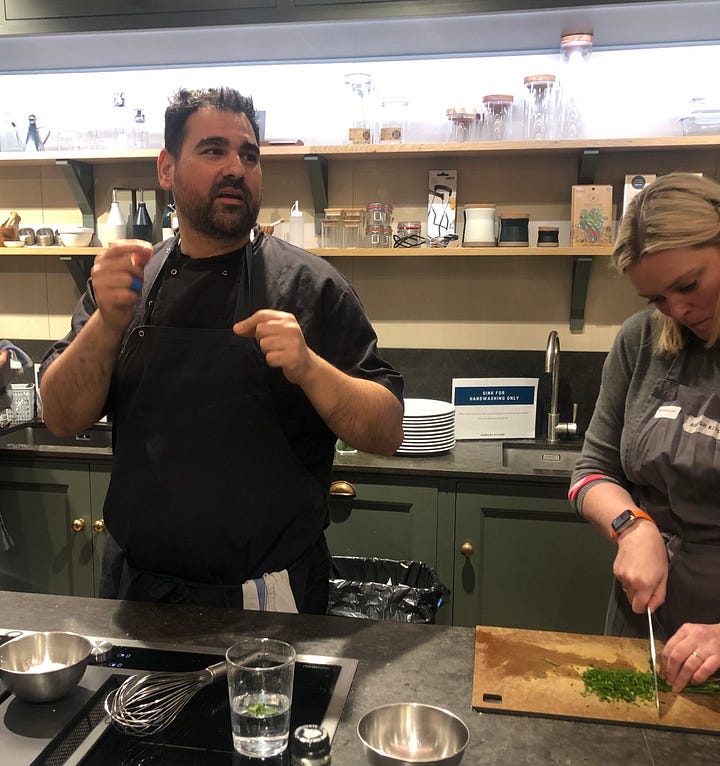
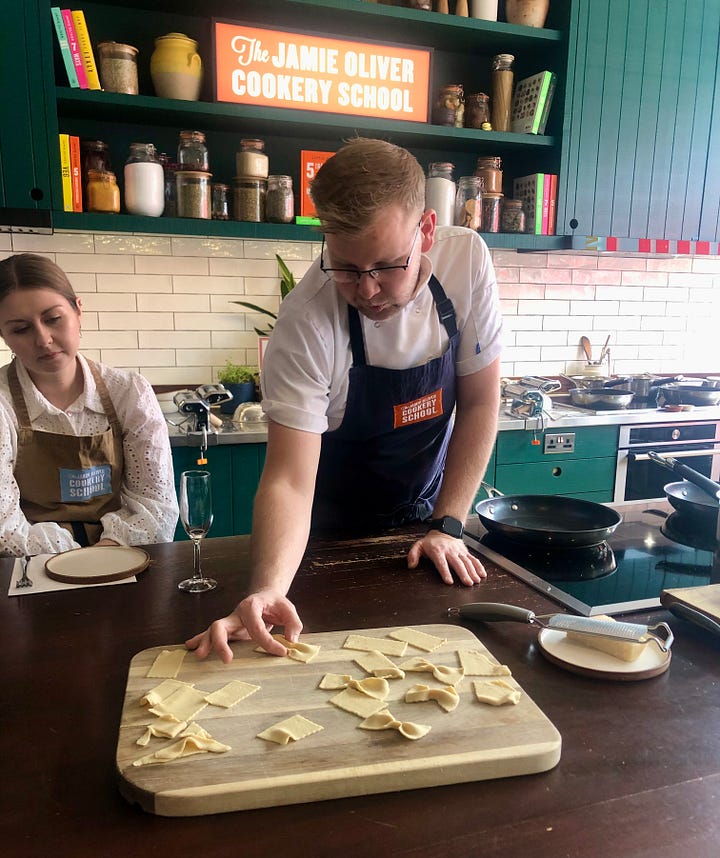
I have cooked a majority of days these past 40 years. I rarely give any thought to the feel of the chef’s knife in my right hand, the shimmer of the oil in the pan in front of me, the salt crystals I grind between my fingers into a dressing.
But then I chanced upon Marco Pierre White’s mesmerising BBC Maestro cooking course online, with his insistent mantra: “question why you’re doing what you’re doing.” The first video I watched was of him making eggs: “only a fool would rush scrambled eggs.” He’s changed the way I make mine. And it set me thinking about how I had learnt to cook over the previous decades: might it finally be time get some professional instruction?
For I am an entirely self-taught cook. I grew up in a household with a traditionally gendered division of labour: the kitchen was my mother’s domain and my father never cooked anything at all. My mother’s cooking was tasty and interesting for its day, and we took food seriously: it kindled in me a passion that has lasted a lifetime.
Moreover I harboured a loathing of institutional food triggered by the trauma of school dinners: as university approached, I was damned if I was going to take my risks in the canteen. So on a February morning during my gap year, I set about learning how to cook.
My mother has too little patience to be a good teacher (I got those genes) and I suspect she resented my intrusion into her kingdom. So despite my pleas for her to teach me, I knew I’d have to do it myself. And somehow, at home and later in a tiny, nasty shared kitchen at college, I learnt the basics of food preparation.
I didn’t really realise how much kitchen knowledge I’d internalised until years later, living in America, when I tried to teach a girlfriend to cook – and realised I couldn’t explain what I was doing. How did I know how much water to put into the rice? How could I tell when the oil was hot enough to add the chopped onion? How did I know how to joint a chicken? I just did.
So what could I learn now, in my late fifties? London offers as wide a range of cooking classes as you’d expect, though most tend to be focussed on restaurant experiences rather than kitchen technique as such: say, creating a three-course meal at Restaurant Gordon Ramsay.
The first class I took offered a different kind of experience. Migrateful is an innovative charity that aims to support refugee chefs into work in the hospitality industry. As part of its work, chefs give group cooking classes in cuisines as varied as Kurdish, Afghan, Moroccan and Congolese. They’re fun and reasonably priced: on an evening in Islington, Noor, our Pakistani teacher, taught us how to make chicken biryani, raita and other side dishes.
But while the end results were delicious, I didn’t feel like I’d learnt much in the way of new techniques. For that, I tried cookshop Borough Kitchen. They offer a a wide range of classes across several London locations focussing both on particular foods (Chinese dumplings and bao; filled pasta; French patisserie) and on techniques. Of the latter, I’ve written before about Clare Heal’s excellent fermentation and pickling class, a glimpse into an unimagined world of food chemistry.
But for more straightforward skills, I took Borough Kitchen’s Applied Knife Techniques class, led by Panos, a burly Greek: “of course we’re going to use a ridiculous amount of olive oil!” We cooked braised capon with layered sweet potatoes and onions and a fennel and orange salad, in the middle of Borough Kitchen’s Islington branch, after store hours.
Aside from the fact that I’d never cooked a capon – and the results were very good - I did indeed learn some useful knife skills. Panos quickly corrected the way my left hand was holding what I was chopping: “You don’t like this thumb – you’re trying to lose it?” I did sort of know I wasn’t doing it right – a professional chef uses a safer “claw” grip with fingers tucked under – but it’s hard to get out of a decades-long habit. Panos suggested I just try to correct myself each time I cooked and that it would eventually stick. I’m still practising.
While Borough Kitchen’s classes cater to a range of abilities, most of my fellow students seemed reasonably confident. There was less experience on show at the two classes I tried at the Waitrose Cookery School, cooking chicken shawarma and, on another occasion, ribeye steak (I wrote about the latter here.) But our teacher, Charmaine, handled the range of abilities with aplomb, answering some quite basic questions – “what does ‘deglaze the pan’ mean?” – and trying to foster a sense of confidence: “If something smells a bit raw still, it probably is. Try to trust your senses.”
I realised that I was already using a lot of her techniques without ever having thought about them, such as seasoning at every stage to get it correct. But I picked up a series of new tips too: checking the consistency of the peppercorn sauce we cooked for our steaks by drawing a finger through the sauce on the back of a wooden spoon; oiling the steak rather than the pan; and judging doneness by the feel of the meat, aiming for a springiness about like the flesh below my thumb.
Lastly I tried out the Jamie Oliver Cookery School, tucked in a nondescript shop front in Highbury (Oliver’s HQ is in the same building, product development, marketing and all.) “Hello chefs!” exclaimed our cheerful Polish teacher, Kris, and we were off on a couple of hours devoted to making pasta.
I’ve made my own pasta for a long time though don’t do it often – in fact the only pasta I ever make is lasagne, such is the difference in final results between home-made and dried lasagne sheets. After Kris’s slick pasta rolling demonstration, I’m embarrassed to say I discovered I’d been making mistakes for years: I’d never kneaded my pasta at home anywhere near enough, making it harder to roll out later.
I’d also never previously made small pasta shapes: here we made farfalle (bow tie-shaped pasta), absurdly easy, though I wouldn’t have guessed it. Once again, I mainly learnt a succession of useful tips rather than one big new technique: a useful pasta hole-mending technique; putting more salt in water for fresh pasta than dried (it’s in it for less time); adding a little pasta water to our mushroom sauce make it creamier; and the way to successfully freeze maltagliati (pasta offcuts) dusted with a little flour.
In all, my cooking classes have been an energising experience. f you’re a keen cook, it’s easy to forget the skills you use every day, or rather, not to notice what you know - and what you don’t. There’s nothing like being taught by a professional to heighten your awareness of both. Next up for me: whole fish cooking at Borough Kitchen. It turns out you can teach an old cook new tricks.
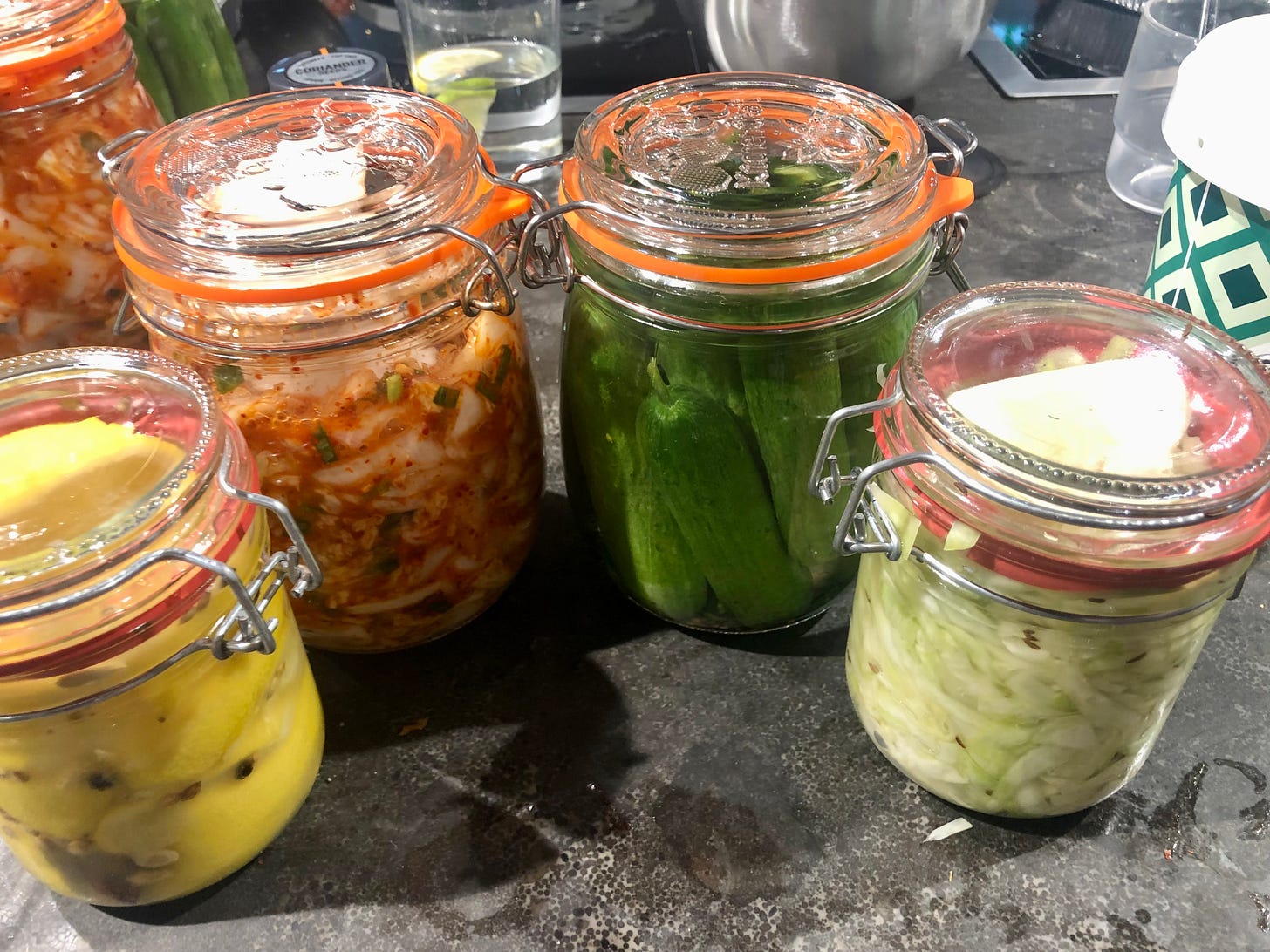
What I’ve been drinking this week
Domaine Coste Rousse “Thalia” orange 2022, IGP Côtes de Thongue - my friend Emma Twidale, the brilliant young Canadian sommelier at Peckham’s Levan restaurant (until the end of this month), suggested I try this last week. It’s an orange wine from the Languedoc, made from majority Viognier - offbeat, as quite a lot of Emma’s list is, yet clean, fresh and expressive, delicately floral with notes of orange and honeysuckle. Lovely (The Modest Merchant, £20.95.)
Domaine Karydas 2017, Naoussa - classic Greek Xinomavro with a little more bottle age than most seen in this country: this is fragrant, structured and long (Dark Sea Wine, Salusbury Winestore, from £26.)
Lyrarakis Liastos 2022, PGI Crete - another wine from Emma Twidale at Levan. “Liastos”is the Greek term for straw wines made like an Italian passito, where grapes are dried in the sun to concentrate their sugar. This one, from one of my favourite Cretan producers, is made from Vidiano and five other local white grapes. It boasts a complex palate of apricot, caramel, honey - but it’s wonderfully fresh and not at all cloying. (The Whisky Exchange, Woodwinters Wines and Whiskies, Cambridge Wine Merchants and elsewhere, half bottle from £16.96.)




I’m self taught as well, my mum was not a good cook bless her, but I have done a couple of day courses. You pick up the most unexpected things, like shaking the food processor half way through making the pasta and adding a drop of sherry vinegar at the end of cooking your mushroom soup to enhance the flavour. Also did a sourdough one day course which was invaluable.
Marco P-W is such a charismatic character. His cooking seems pretty old school in the series but it’s just so watchable